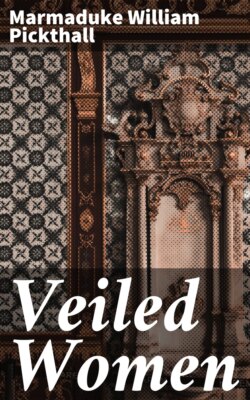Читать книгу Veiled Women - Marmaduke William Pickthall - Страница 5
На сайте Литреса книга снята с продажи.
CHAPTER III
ОглавлениеTable of Contents
Immediately on his return to his own house, Muhammad Pasha sent a eunuch to announce his coming to the lady Fitnah. He found her lying on a couch in her state-room. Two slaves, who had been busy fanning her, retired before him. Seeing she lay still with eyes closed as if quite exhausted, he drew near and whispered:
“Now, in sh´Allah, O beloved, thou wilt hear my reasons.”
She opened great brown eyes, bloodshot with wrath, and glared at him a moment.
“Well, what news?” she asked, with studied coldness.
The Pasha then embarked upon his story; but, at mention of the Consul, she sprang up with rage renewed, expectorating:
“Curse thy father! ‘She will see the Consul,’ sayest thou? The Consul! May the Consul and his whole race rot with agony! It is simply to evade a duty which is thine and thine alone. Eject her from the house at once, thou paltry coward! She will kill our son. I know thy guile, by Allah! Thou wilt say, ‘The Consul orders her to marry Yûsuf. We must obey the Consul,’—O salvation!—when all the while thyself art father of the mischief. Oh, let her not come here, or, by my fruitfulness! these hands shall cling to her and not leave hold till they have made her so that no man could desire her.”
Expostulation proving vain, her lord retired in great annoyance. He had to fear a scandal in his house, an inquisition by the Consul, ignominy, if Yûsuf’s mother came in contact with the English lady.
In this dilemma, as in every other which concerned the household, he went for counsel to his only love and first of wives. He sent a herald of his coming to Murjânah Khânum, and after a decent interval repaired to her apartments. She received him in a large room, with no other solid furniture than a low desk on which a manuscript of the Corân lay open; but exquisitely clean and sweet, a contrast to those quarters of the house where Fitnah reigned. The windows were constructed of the finest lattice-work, which made the light within seem rare and delicate. Murjânah, old but stately, fondled her lord’s hand.
“Thy face is careworn,” she exclaimed, perusing it. “In sh´Allah, all the news is good.”
“In sh´Allah,” he replied mechanically. “But Allah knows that I am greatly troubled. I know not what to do.” And he proceeded to describe the madness of the lady Fitnah. At the tale’s conclusion, a light laugh surprised him.
“Thou askest what to do,” exclaimed Murjânah, “when there is danger that a foolish woman, mad with jealousy, may harm a guest of ours! Hear the word of Allah: ‘When ye have cause to fear their disobedience, ye shall reprimand them, ye shall banish them to beds apart, and ye shall beat them.’ Is not that plain? Beat her! It is thy sacred duty. No, no, she will not cry against thee to the Câdi. She will hide her fault. All women look to men for government, and if it is withheld, have cause of grief. Trust me, beloved, there is no good woman who would not rather suffer stripes occasionally than grow for lack of them into a shrieking harridan. Fitnah Khânum is my durrah, and I love her truly, as the mother of our darling children, and for many virtues. Still I say to thee on this occasion: beat her soundly. Bestow on her a perfect beating, O my soul!”
The Pasha kissed his old wife’s hand submissively, and went forth from her presence with a face of awe. The high proceeding needed courage, for a man so kindly. He went to the small chamber where the eunuchs sat when not on duty, and called, “Sawwâb! Meymûn! Bring me a big kurbâj. Attend me, both of you!”
The silent, swift obedience of those servants showed the impression made by his unusual sternness. Their help was necessary that the scene to come might wear the aspect of an execution, not a struggle.
Whip in hand, Muhammad Pasha crossed a courtyard and entered a small room remote from others.
“Bring Fitnah Khânum hither secretly!” he told the eunuchs.
Sawwâb, the fat, was seized with trembling; while Meymûn, a tall, gaunt creature, gave a deathlike grin. They sped, however. Three minutes had not passed before the lady Fitnah, deftly bound and gagged, was borne into the lonely chamber and the door was shut.
Half an hour later, Muhammad Pasha Sâlih sat conversing with the English lady, preparing her intelligence to meet the Consul’s arguments, which he forewarned her would be all misstatements born of blind fanaticism. When married to Yûsuf, he assured her, and himself believed it, she would hardly know the difference from an English home.
